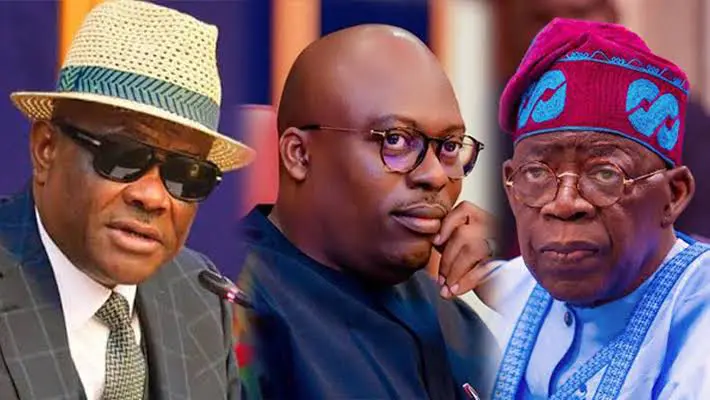President Bola Ahmed Tinubu’s reinstatement of Governor Siminalayi Fubara of Rivers State has triggered a wave of sharply divided responses from political stakeholders, legal experts, and civil rights activists.
On 18 March 2025, President Tinubu declared a state of emergency in Rivers State, suspending Governor Fubara, Deputy Governor Ngozi Nma Odu, and all members of the state House of Assembly. In their place, he appointed a sole administrator, retired Rear Admiral Ibok Ibas, to govern the state.
However, in a national broadcast on Wednesday, Tinubu announced the termination of the emergency rule, effective midnight on 18 September.
“The Governor, His Excellency Siminalayi Fubara, the Deputy Governor, Her Excellency Ngozi Nma Odu, and members of the Rivers State House of Assembly, including Speaker Martins Amaewhule, will resume work in their offices,” the President stated.
Wike: Tinubu committed to peace, democracy
Minister of the Federal Capital Territory and former Rivers State Governor, Nyesom Wike, praised the President’s decision, hailing it as a reaffirmation of his commitment to peace and democratic governance.
In a statement issued through his media aide, Lere Olayinka, Wike said: “The President’s proactive action saved Rivers State and restored the confidence of the people in his leadership.” He further called for unity among stakeholders and warned against those seeking to incite further unrest in the state.
Atiku: An illegality, not worth celebrating
In stark contrast, opposition leader and former Vice President Atiku Abubakar, through his media adviser Paul Ibe, condemned the entire process as illegal and unconstitutional.
Ibe said that the President lacked the authority to suspend a democratically elected governor. “There is nothing to celebrate. Tinubu’s action was a clear abuse of power. The opposition is being decimated, and state institutions are being weaponised for political gains,” he said.
He accused the Tinubu administration of attempting to coerce opposition figures into the ruling All Progressives Congress (APC) and described the reinstatement as “immaterial” since the suspension itself was without legal basis.
Idam: Fubara has been neutralised
Human rights lawyer Maduabuchi Idam criticised the reinstatement, calling it a “hatchet job” aimed at politically weakening Governor Fubara.
“Fubara has been decimated, neutralised. The President has not addressed the supposed security crisis used to justify the emergency in the first place,” Idam argued. He claimed the crisis was politically motivated, stemming from a rift between Wike and Fubara.
Idam also questioned the Governor’s political integrity for accepting reinstatement without legal resistance. “He is now a puppet, not even fit to be a deputy governor. His authority has been completely eroded,” he said.
Adeyanju: A dangerous precedent
Civil rights activist Deji Adeyanju described Tinubu’s actions as a dangerous precedent that harkens back to Nigeria’s military past.
“The President has dragged us back to the era of dictatorship. It is even more ironic that someone who once fought against military rule is now acting like a military dictator,” he said.
Adeyanju also criticised the judiciary and opposition parties for their silence and inaction, calling it a collective failure of Nigeria’s democratic institutions.
CUPP: Reinstatement welcome, emergency declaration condemned
The Coalition of United Political Parties (CUPP) welcomed the end of the emergency rule but condemned its initial declaration as an unconstitutional act of federal overreach.
“The suspension of duly elected officials over a political disagreement was a direct assault on Nigeria’s democratic principles. Such arbitrary actions undermine the will of the people and the independence of democratic institutions,” the coalition said in a statement.
A nation divided
As Governor Fubara resumes office, the political atmosphere in Rivers State remains tense, with ongoing debates about the legality, morality, and implications of the President’s actions.
While some view the reinstatement as a step toward restoring democratic order, others see it as a smokescreen for unchecked executive overreach, setting a precedent that could erode Nigeria’s fragile democracy.



